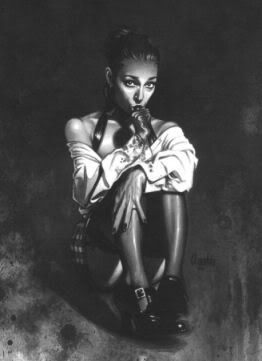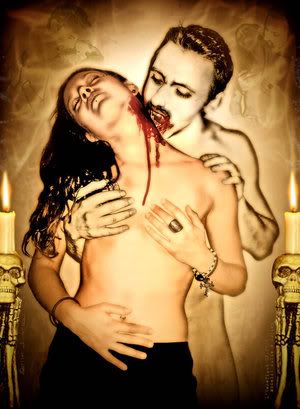



Human Living Vampires (HLV's) are individuals who, while they firmly assert that they are essentially human beings, and to all external appearances are exactly that, nevertheless have pronounced vampiric characteristics having a need, compulsion, or involuntary tendency to "feed" upon some substance or some kind of energy produced by other living things, primarily other people.
HLV's fall into two main classes: sanguinarians who experience blood-lust or blood-craving, and "psychic vampires" or "psi-vampires". Boundaries among categories can be hazy and overlap considerably, and there is no rule that says a bona fide HLV might not also be interested in lifestyle vamping or be a blood fetishist.
Within these two larger categories, there are several subdivisions among self-defined HLV's. There are also a number of different "theories" proposed by HLV's to explain their own origin, or the cause(s) of their conditions.
Human Living Vampires are human beings who are born, grow up, age, and fully expect to die at the end of a conventional lifespan. No HLV claims to be immortal, invincible, or possessed of supernatural abilities.
However, many members of these groups believe themselves to have some form of sensory amplification or extrasensory perception, such as:
Improved night-vision, sometimes to the point of being able to see without even moonlight
Stinging of the skin when exposed to sunlight
An ability to sense other vampires
Broader range of senses
Prescience, or the capacity to instinctively predict the immediate future
Perception of auras
Although some report enhanced strength, stamina, resistance to disease, and so forth, in no case do these traits exceed the limits of human norms. They are prone to any illness or injury that afflicts human beings. They can and do have children. They have normal nutritional requirements (although some HLV's report unusual food cravings, allergies or aversions) and in all other ways are bound by natural law.
Awakening

Awakening is a term that described the physical and mental changes that occur when someone awakens and discovers he is Otherkin.

The awakening typically occurs during or shortly after the onset of puberty, but in some cases can occur much later around the thirties or even forties.
In the case of Sanguinarians and Psi vampires, the person undergoing the awakening will be altered physically and mentally.
These changes often include an increased sensitivity to light and particularly to sunlight, a growing affinity for night and darkness, having one's circadian rhythm become inverted and switching from a nocturnal to a diurnal sleeping schedule, and experiencing the first symptoms of the thirst.
Many experience acute feelings of isolation and alienation during this process, as their changing nature distances them increasingly from their "normal" family and friends.
Turning

The physical and mental changes that occur when someone awakens to their latent vampire nature are referred to as "turning". Sometimes it is also referred to as "being embraced", a phrase from role-playing games, and there are a few other terms drawn from vampire fiction ("the dark gift", "the dark kiss", "bringing across", and «bloodsiring", for example).
Some groups believe that ordinary people can be turned into vampires, but this is most likely a misinterpretation of the awakening process. Those experiencing the awakening, undergo various mental and physical changes which occur during or shortly after the onset of puberty, but in some individuals may take years to manifest.

However, only a minority of HLV's gives full credence to the possibility of "turning". The majority of HLV's of all types believe that they were born as they are and cannot be "turned" or "turn" anyone who is not also an HLV by birth themselves. If someone appears to have been turned, he or she was most likely a latent vampire to begin with.
The method for this turning varies from group to group, but generally involves a rite of blood or energy exchange between the vampire and the person to be turned. Blood vampires most often identify an experience of sharing blood with another person who was already a blood vampire. Psychic vampires may identify an experience in which they "linked" or psychically bonded with an existing psychic vampire, sometimes via such media as online chat or the telephone.
Feeding

Both blood-drinking and psi-draining HLVs use the term "feed" to refer to what they actually do. Representatives of both groups have made strong statements to the effect that "feeding" (on blood or "energy") is what makes a Human Living Vampire what it is, and that other identifying "traits" or characteristics (if any) are of little or no importance.
"Feeding" appears to be a given not an option; an HLV must feed, feels a compulsion to do so, in the case of psychic vampires may do so involuntarily, and yet nobody seems to understand why.

This desire to feed also identified as the Thirst, Hunger or the Need, bears strong parallels with drug addiction. Pulse, heart rate, blood pressure, and sometimes even body temperature, increase in anticipation of the act of feeding. Blood-craving HLV's assert that only the communion of taking blood from a consenting human donor, sometimes during sex, is truly satisfying to them. The "need" that HLV's experience is for a fix, not a meal.
The chief concern for most HLV's seems to be how to "feed" more efficiently, how to find "donors", how to guarantee a regular supply of the needed substance, and so forth--very similar to drug addicts.
"Secondary symptoms" of vampirism (that are not directly related to an HLV's craving for blood and/or energy) include sensitivity to sunlight, a tendency to be awake and alert at night but lethargic during the day, migraine headaches as a common malady
RECENT FORUM POSTS
Premiere Sire (126)
Bottoms Up
03:36 - February 28 2025
READ POST

Premiere Sire (126)

Premiere Sire (126)
REAL VAMPIRES LOVE VAMPIRE RAVE
Vampire Rave is a member of
Page generated in 0.0452 seconds.









